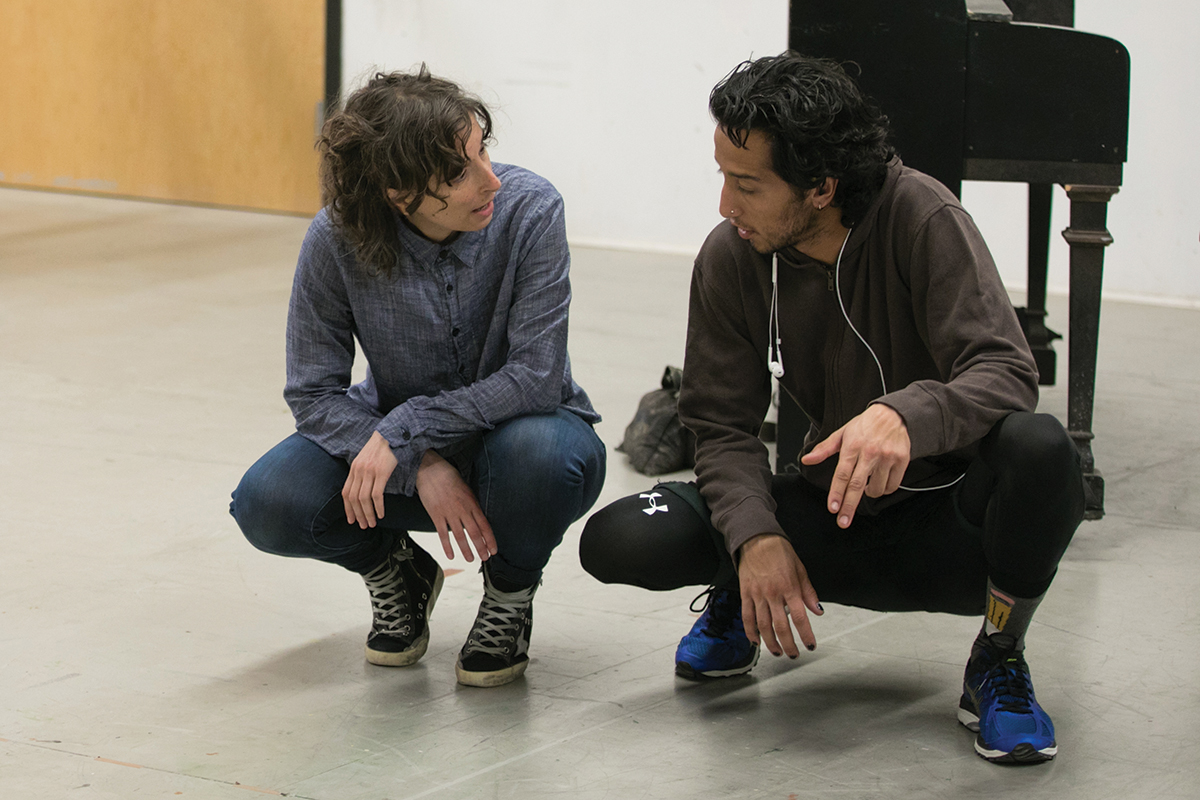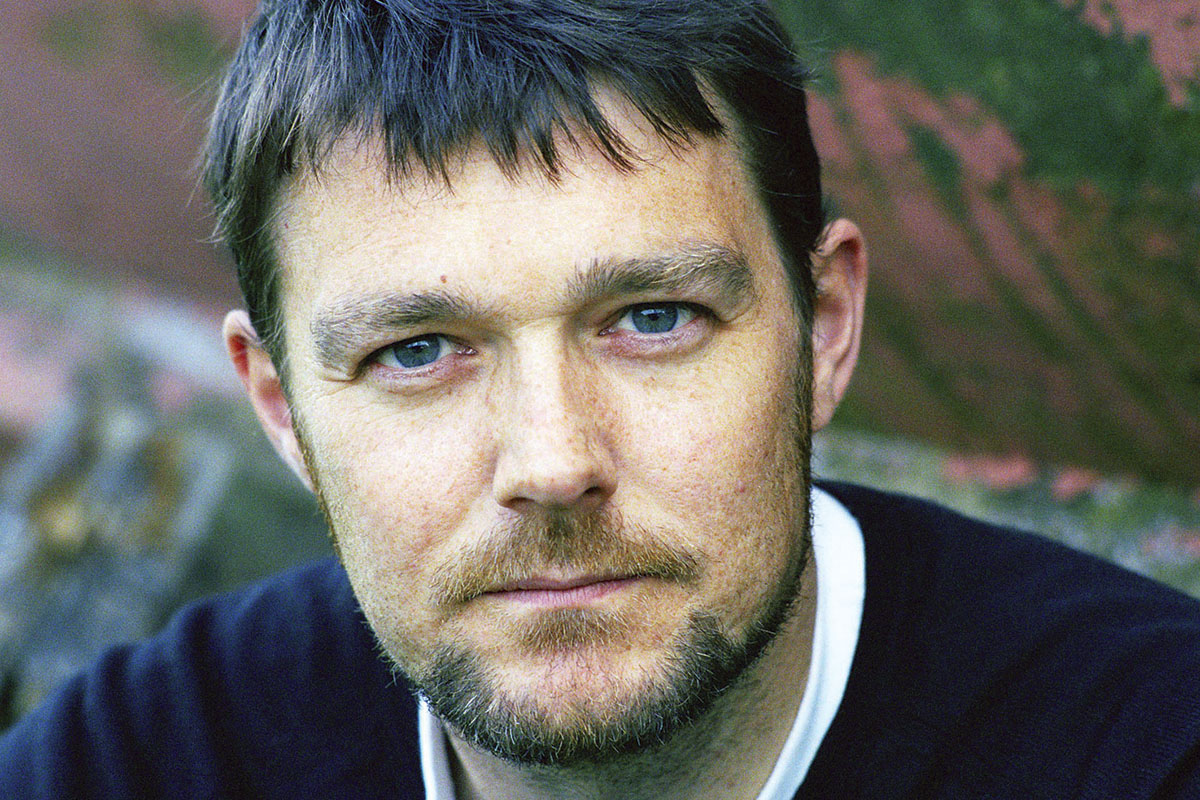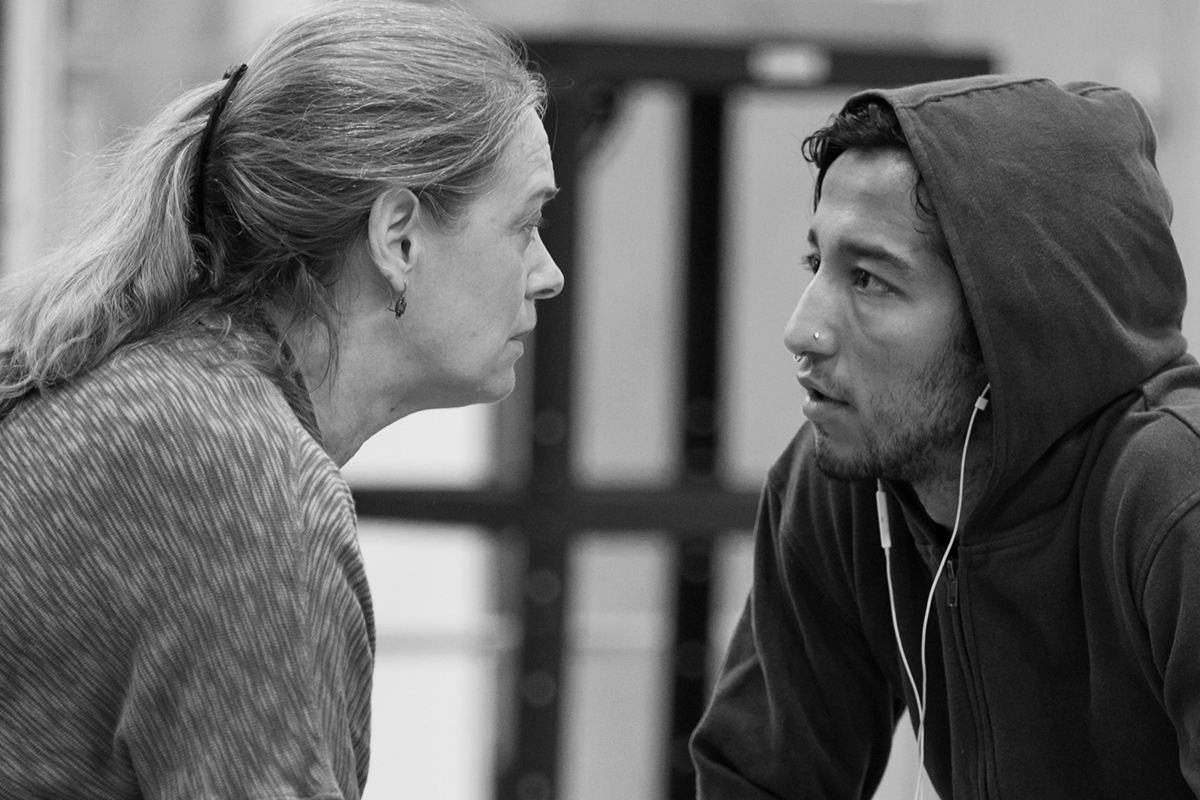Behind the Scenes
After a tragedy we always ask why? If we can answer that question, can we prevent future tragedies? Playwright David Greig began work on The Events after the horrific massacre on a Norwegian island in 2011. He created a potent story with “Claire”, the surviving leader of a community choir, and “The Boy” who portrays a range of characters including Claire’s lover, her therapist, a politician, a kind stranger, and the gunman who commits the crime. Greig also included the unique stipulation that a different community choir sing with each performance. They witness and experience the play for the first time along with the audience.
From Director Susannah Martin

Susannah Martin and Caleb Cabrera as The Boy, in rehearsal. Photo by Cheshire Isaacs.
“I don’t want to understand what happened to me.
I know what happened to me.
I want to understand what happened to him.”
—Claire, The Events
This play is a mystery; a mystery that our protagonist, Claire, spends the play trying to unravel: why? Why did The Boy do it? What or who shaped him? What motivated him? What box can we put him in so that we can stop this from ever happening again? How can we stamp this evil out?
Every time events like these happen, I ask the questions Claire asks. I find very few answers, feel hopeless, and stop my search. Another event happens, the same cycle repeats. These days, it is easy to wander the world in a state of perpetual grief, asking why. There is so much we don’t know about each other. Who shaped us? What motivates us and drives us to do the things we do? Even in—especially in—our “connected” world, is it possible to find any understanding of someone else?
Susannah Martin and Caleb Cabrera as The Boy, in rehearsal. Photo by Cheshire Isaacs.In these strange times, I am grateful for a play like this—a play that is both salt in the wound and a balm to the soul. I am grateful that the play asks the questions that it asks us, and sends us, with Claire, on a search for clarity and understanding. It pushes us to embrace our darkness in order to find the light within the abyss. It invites us to sit with, even sing with, strangers and commune and communicate in the midst of our difference. The play provides no easy answers, no box to put people in. And yet, it shows that rebirth is possible even though evil is — and will always be — in the world.
A Challenging Moment

David Greig, playwright. Photo by Katrin Ribbe.
In an interview with The Telegraph , prior to the debut of The Events in 2013, David Greig commented:
“It’s quite a challenging moment, realising that your empathy has a limit… As a dramatist, the discovery of this voice you’re trying to suppress, the violence of retribution, demanded to be explored on stage.” David Greig travelled to Norway after the ‘events’ of the massacre to conduct interviews. He describes the process, and an unexpected discovery, in an interview with Contemporary American Theatre :
“...We [David and director Ramin Gray] went to Norway in December 2011. And… I really didn’t like it. I was very depressed by the whole business. I mean it was obviously depressing to think about it but the closer we got to it I just thought this is just awful; this man is a sad case, a hopeless sad case.
“[Then one day] the dramaturg we were with said ‘okay, we’ve done our interviews and we’ll do some more tomorrow, but on the way back we need to stop and pick up my mum, who is at choir practice, and we might have to wait around for about half an hour until they finish. You can wait in the car or you can come in and sit at the back’. And it was choir practice, in a school in the suburbs, and we weren’t thinking that this was any part of our research; we were literally just stopping on our way to somewhere else. But it was a school hall, with the school bucket chairs and, you know, the pianist and a conductor who was saying ‘well, we’re going to do a concert in the mall at Christmas and so we need to practice that now’. Just a really ordinary community choir. But without realising, both Ramin and I had this feeling, I had this feeling, that I was just bathing in restorative humanity. And one of us said to the other, ‘is this it? Is this the idea?’ And if that hadn’t inadvertently happened, I don’t think I would have written the play. Because I couldn’t see a way, I simply couldn’t see a way to write something that would not just be so bleak… so I probably would have just done something else.
“So we immediately knew that the community choir was the thing and that there would be a different choir every night. The character of Clare came a little bit later on, and at first just her on her own...And, basically, we felt that there was something rather… tawdry, actually, about having other people… if we had the character of Katrina, or the psychologist, and they’d be played by different people – something just felt wrong about that. So we realised that there had to be one other actor and that actor would become [those other characters]. The Events is a very difficult play to talk about because its form makes it not what it could be. And that is the whole point, you experience its form.”
We're All Here

Julia McNeal as Claire and Caleb Cabrera as The Boy, in rehearsal. Photo by Cheshire Isaacs
In Ancient Greece, playwrights used a Chorus to comment upon the action - and to serve as a connection for the audience. Also, the Chorus passages were not spoken but sung! Fast forward thousands of years and we have The Events, a play that incorporates a choir to connect us with the action of the play. Director Susannah Martin comments: “They are Claire’s choir. But they also act as her conscience, the Greek Chorus, and, most importantly, the community in which we live; the community that comes together each night in a shared space to talk, to wonder, to rage, to grieve, to commune and, of course, to sing.”
The Events explores a the journey of Claire, a survivor, with compassion, humor, sorrow, and yes, song. Learn more about the choirs performing in The Events here.
From the script of The Events:
Claire welcomes them.
CLAIRE: Come in.
Don’t be shy.
Everyone’s welcome here.
We’re all one big crazy tribe here.
If you feel like singing – sing
And if you don’t feel like singing.
Well that’s ok too.
Nobody feels like singing all the time.
Are we all here? Good. Sing.
Playwright David Greig brought The Events to Norway in 2014. Read more about his experience presenting the play to people who survived the 2011 massacre here.





